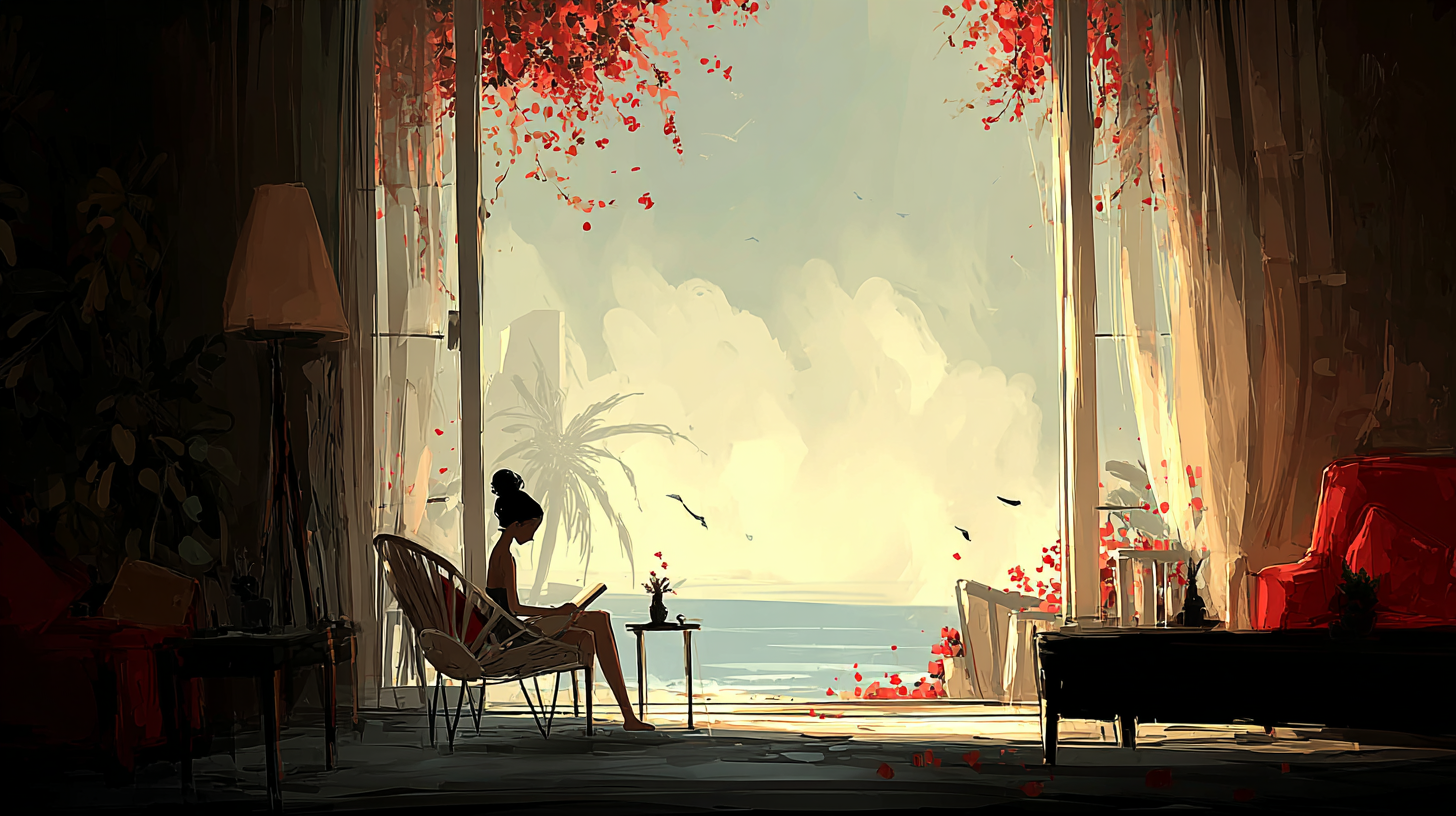“Luxury” means something expensive and special that makes life more comfortable and happy, but is not needed.
「luxury」は、なくても生きていけるけど、あるとすごく快適でうれしい高級な物や体験のこと。
以下は英単語 “luxury” に関するストーリー型学習コンテンツです。まずは大枠の意味を理解して最後の文章で確認しましょう。
主な意味(main meaning)
| 品詞 | 意味 | 発音記号 | 英語例文 |
|---|---|---|---|
| 名詞 (noun) | 高価で快適なものや体験 | /ˈlʌkʃəri/ または /ˈlʌɡʒəri/ | She stayed in a hotel full of luxury and elegance. |
| 名詞 (noun) | ぜいたくなこと、必要ではないが楽しめるもの | /ˈlʌkʃəri/ または /ˈlʌɡʒəri/ | A long vacation is a luxury I can’t often afford. |
語源(etymology)
「luxury」はラテン語 luxuria(贅沢、過剰)から来ており、”光(lux)”が語源に含まれることもある。
「光り輝くような豊かさ」や「必要以上の快適さ」が核イメージ。
類義語(synonyms)
| 類義語 | 例文 |
|---|---|
| opulence | The room was decorated with opulence and gold accents. |
| extravagance | Buying a sports car was a huge extravagance. |
| comfort | This chair provides great comfort after a long day. |
| indulgence | Chocolate is my favorite indulgence after dinner. |
| richness | The richness of the meal surprised the guests. |
反義語(antonyms)
| 反義語 | 例文 |
|---|---|
| poverty | Many people live in poverty without access to basic needs. |
| necessity | Water is a necessity for survival, not a luxury. |
コロケーション(collocations)
| コロケーション | 例文 |
|---|---|
| luxury hotel | We stayed at a luxury hotel near the beach. |
| live in luxury | She dreams of earning enough to live in luxury. |
| luxury goods | The store sells expensive luxury goods. |
| a touch of luxury | The soft pillows added a touch of luxury to the room. |
| afford a luxury | Not everyone can afford a luxury vacation. |
2項表現(binomials)
| 表現 | 例文 |
|---|---|
| rich and famous | The rich and famous often enjoy luxury every day. |
| comfort and luxury | The cruise offers both comfort and luxury. |
| wealth and luxury | He is used to a life of wealth and luxury. |
英語ストーリー(english story)
Title: A Touch of Luxury at Work
Mina had been working at the small accounting office for over five years. Every day was the same—simple coffee, a noisy printer, and endless spreadsheets. She never thought of herself as someone who needed luxury. However, after receiving a big promotion, her boss gave her a gift: a voucher for a weekend at a luxury hotel by the seaside.
At first, she felt it was too much. “Isn’t this an extravagance?” she asked her boss. He smiled and said, “You’ve earned a little indulgence.”
When Mina arrived at the hotel, she was shocked by the opulence of the lobby. Everything shone with gold and marble. Her room had the comfort of a palace, with soft beds and a balcony view of the ocean. For the first time, she understood what it meant to live in luxury.
During dinner, she thought about how this experience was not a necessity, but it brought joy and peace. She wrote in her journal, “Maybe sometimes, a little touch of luxury is what we need to feel truly appreciated.”
On Monday, she returned to the office, not just as a promoted employee, but as someone who had tasted the balance of comfort and luxury.
和訳
タイトル:職場でのちょっとしたぜいたく
ミナは小さな会計事務所で5年以上働いていた。毎日は同じで、普通のコーヒー、うるさいプリンター、そして終わりのないスプレッドシートの作業だった。自分が**luxury(ぜいたく)**を求めるタイプだとは思っていなかった。
しかし、大きな昇進を受けたあと、上司からプレゼントをもらった。それは海辺の**luxury hotel(高級ホテル)**で過ごす週末の宿泊券だった。
最初は「これは**extravagance(ぜいたくすぎること)じゃないかな」と感じたが、上司は笑って「少しのindulgence(自分へのごほうび)**くらい、受け取っていいよ」と言った。
ホテルに到着すると、ミナはロビーの**opulence(豪華さ)に驚いた。金や大理石で輝いていた。部屋はまるで宮殿のようにcomfort(快適)で、柔らかいベッドと海の見えるバルコニーがあった。初めて彼女はlive in luxury(ぜいたくに暮らす)**とはこういうことかと実感した。
夕食のとき、これは**necessity(必要なもの)ではないけれど、心に喜びと安らぎを与えてくれると感じた。彼女は日記にこう書いた。「ときにはa touch of luxury(ちょっとしたぜいたく)**が、自分が大切にされていると感じるのに必要なのかもしれない。」
月曜日、ミナはただ昇進した社員としてだけでなく、**comfort and luxury(快適さとぜいたく)**のバランスを知る人として職場に戻ってきた。
Q&A
- Q「luxury」と「opulence(豪華さ)」の違いは?
- A
「luxury」はぜいたくな物や体験そのものを指すのに対し、「opulence」は見た目のきらびやかさや空間の豪華さを強調します。たとえば、「luxury hotel」は高級なサービスや設備を含むホテルですが、「opulent hotel」と言えば、特に装飾の豪華さに注目しています。
- Q「luxury」と「extravagance(浪費・度を越したぜいたく)」の違いは?
- A
「luxury」はある程度の高級感を楽しむことを意味しますが、「extravagance」は必要以上にお金を使いすぎる、無駄なぜいたくというネガティブな意味合いがあります。
例:「a luxury car」は高級車、「an extravagance」になると“買わなくてもいいのに買った高すぎる物”というニュアンスになります。
- Q「luxury」と「comfort(快適さ)」の違いは?
- A
「comfort」は「心地よさ」や「不快でない状態」を指し、ぜいたくではなくても得られます。「luxury」はそれに加えて高級で特別な体験や物を表します。
たとえば、普通の布団でも「comfortable」ですが、高級ホテルの羽毛布団は「luxurious」です。
- Q「luxury」と「indulgence(ごほうび・甘やかし)」の違いは?
- A
「indulgence」は自分へのちょっとしたごほうびや、好きなことを我慢せずにすることを指します。「luxury」はその内容が特別に高級であることを含意します。
例:チョコレートを夜に食べるのは「an indulgence」。高級チョコを買って食べるのは「a luxury and an indulgence」の両方になります。
- Q「luxury」と「richness(豊かさ)」の違いは?
- A
「richness」は金銭的な意味以外にも、味・色・経験などの「深み」や「充実」を表します。「luxury」は基本的に経済的・物質的な高級さを表すため、「richness」のほうが広い意味を持ちます。
例:料理の「richness」は味の深み、装飾の「luxury」は高価さです。
- Q「luxury」と「necessity(必需品)」の違いは?
- A
これは対義的な関係です。「necessity」は生活に必要なもの(水、食べ物、住む場所)、「luxury」はあってもなくても生きていけるが、あると快適なものです。
- Q「luxury goods」と「necessities」の違いは?
- A
「luxury goods」は高級品(ブランドバッグ、宝石など)、「necessities」は日用品や生活必需品(歯ブラシ、トイレットペーパーなど)を指します。前者は主にステータスや快適さを得るため、後者は生きるために必須です。
- Q「live in luxury」と「live comfortably」の違いは?
- A
「live comfortably」は経済的に安定していて困らない程度の暮らし。「live in luxury」はそれに加えて、ぜいたく品に囲まれた高級な暮らしを意味します。
- Q「a touch of luxury」と「a bit of comfort」の違いは?
- A
「a touch of luxury」は少しのぜいたく、「a bit of comfort」は少しの安心や心地よさ。「luxury」は感覚的にも経済的にも“高級さ”が前提で、「comfort」は精神的・身体的な心地よさを表すので、価値基準が異なります。



コメント